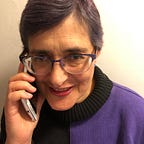Rachel Dolezal’s White Privilege
After reading Ezinne Ukoha’s first post about Rachel Dolezal, I watched the documentary. I understand the anger that our writer and the activists who were interviewed felt. Dolezal didn’t grow up black. She didn’t personally experience racism as a child. Moreover, she is free to stop “being black” at any moment. So, yes, her claims are inauthentic.
Why is she so insistent?
It sounds like Dolezal has some major issues with her parents that contribute to her wanting to be black. She and her siblings have suffered real pain. Because the people she loves most are black, it’s understandable that she wants to share their identity. The same impulse may be what prompts minority children with white parents to say they wish they were white so they would look like their family.
I’m also a white mother of an African American son. Our family was created by adoption rather than biology, so there was no black parent in our home. We knew that we owed it to our son to prepare him to be a healthy black man. That meant finding ways for him to have other adults in his life who could address the needs that we couldn’t meet ourselves. His needs were the top priority when we decided where to live, worship, find child care, and enroll him in school.
It’s likely that Dolezal’s immersion in the black community was beneficial for her sons in some ways. But it seems to me that Dolezal put her own needs before those of her children. She focused on her fears as a mother of black children rather than on what her children experienced. Her two older sons urged her to stop presenting herself to the world as a black woman and especially to stop doing interviews about it. Her actions made their lives harder as well as her own.
Toward the end of the film, her sons said that the controversy surrounding their mom would always affect them because they carried her name. Her choice to take an African name and leave her sons’ names as Dolezal made it crystal clear that she was focused on her feelings, not theirs. To me, that’s the saddest part of her story — that she is so focused on her own pain that she doesn’t do the best for her children.
Her boys are wise beyond their years. It’s sad that they have to be the grown-ups in the family.
The bottom line
What Rachel Dolezal doesn’t understand is that loving black family members and raising black sons don’t make her black. These experiences could give her a better understanding than most white people of how racism hurts people. To the extent that white people might hear the message that racism is a web of lies better from another white person, she could have been a powerful ally in the work for racial justice. But Dolezal’s “identifying as black” — her idiosyncratic view of her race — undermined that goal in addition to hurting her children and siblings.
I wish everyone involved peace and healing.
